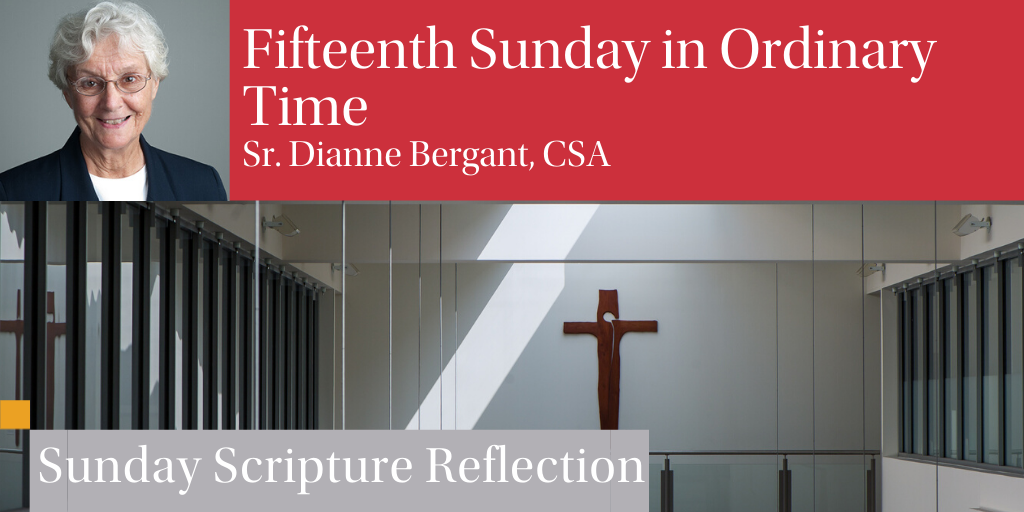

Readings:
First Reading: Isaiah 55:10-11
Responsorial Psalm: Psalms 65:10-14
Second Reading: Romans 8:18-23
Gospel: Matthew 13:1-23
What a wonderful world!
Several years ago, jazz musician Louie Armstrong was inspired by the magnificence of the natural world as he sang of the tenderness of human love. Moved by the luxurious green of trees, the vibrant red of roses, the soothing blue of the sky, the brightness of day and the sacredness of night, all he could exclaim was: “What a wonderful world!”
The biblical authors of today’s readings were also enthralled by the beauty of the world. They employed natural imagery to speak of God and the things of God. Isaiah was in awe of the fructifying potential of the rain as he sang the praises of God’s word. The psalmist painted scenes of the life-giving world when proclaiming the glories of salvation. Paul likened our longing for redemption to creation’s struggle to bring forth new life. Finally, Jesus compared various degrees of openness to the word of God with different kinds of ground. The natural world does indeed lend itself to lessons about God.
How does this imagery work? Metaphors use a well-known characteristic of one reality to throw light on a less-known second reality. For example, we use our experience of rainfall and the natural abundance that it yields to throw light on the life-giving capacity of God’s word. Or, our knowledge of the difference between fertile soil and land that produces only thorns is used to explain various degrees of openness to allowing that same word to take root and flourish in our lives. It is because we are so familiar with natural creation that we are able to appreciate metaphors like these that speak of the mysterious ways of God.
What does this imagery mean? The marvelous cycle of rainfall, evaporation, and then atmospheric condensation is an apt image of the indefatigable power of God’s word, as found in the first reading: “[M]y word shall not return to me void.” Water’s ability to effect vegetation never ceased to mystify the ancient people. They were so entranced by this power that they often regarded water as a divine force that impregnated the earth. The life-giving potential of that same word is captured in Jesus’ parable as well. However, there the focus is on the quality of the land and its ability to bring forth life. Earth’s never-ending fecundity was also considered by some to be divine. Earth was seen as the divine mother who brought forth all living beings. Neither the prophet Isaiah nor Jesus actually believed that these natural elements were divine. However, both of them used nature’s remarkable abilities to make some point about the marvels of the word of God.
What message concerning God’s word do these nature metaphors intend to communicate? The Isaian passage emphasizes the unflagging power of that word. It almost suggests that nothing can stop it from accomplishing its end. The positive imagery employed indicates that this is an oracle of salvation, and therefore, would have been a very consoling message for people who were in the throes of suffering. It assured them that God’s promise of blessing would not be deterred. The gospel does not deny this power, but it insists that the fruitfulness of the yield depends on the quality of the soil. The yield may be thirty, sixty, or hundredfold. In other words, the effectiveness of God’s word is determined by our openness to that word. Employing the metaphor in examining the responsorial psalm, one might say that the rich harvest depicted there could signify a truly fruitful life. But then, it is up to us to decide which kind of soil we are.
There must be a common characteristic for the metaphor to be meaningful, and here is where natural metaphors are particularly challenging today. How will we use them to speak of God’s ways in our lives if features of our world no longer correspond with divine attributes? Would Isaiah compare God’s word with acid-rain? How would the psalmist praise God if the earth were unable to bring forth healthful food? Would Jesus’ sower cast the seed onto land that is polluted? Today we have to wonder whether creation is groaning with the labor pangs of new life, as Paul suggested, or with the cancer of contamination?
What have we done to our world? To God’s world? We have poisoned its air. We have polluted its water. We have contaminated is soil. Can it be saved? Or is it too late? Overwhelmed by the disasters that we have perpetrated, we have been once again astonished by the resilience of this mysterious world. Human quarantine has given our world time to recover. The air has cleared even in San Francisco (our beloved Smog Capital); one can actually see fish in the Venetian canals. Earth has within itself the power to regenerate, if we only give it a chance. But will we? Or are we more interested in claiming our rights as independent individuals, not realizing that we are really interdependent social beings? There is a saying that we would do well to heed: “Earth never forgets.”
Today’s readings should remind us that we are natural creatures and everything about us is a part of the natural world or is mediated to us through that world. This is true even of our understanding of God. The world is not ours; we only hold it in trust. Like the rest of earth’s living creatures, we are dependent on the rain. We come from the earth as from a mother, and we are nourished from this same source of life. These readings remind us that if we just take a moment, we will see that it is truly a wonderful world!
Sr. Dianne Bergant, CSA
Professor Emerita of Old Testament Studies